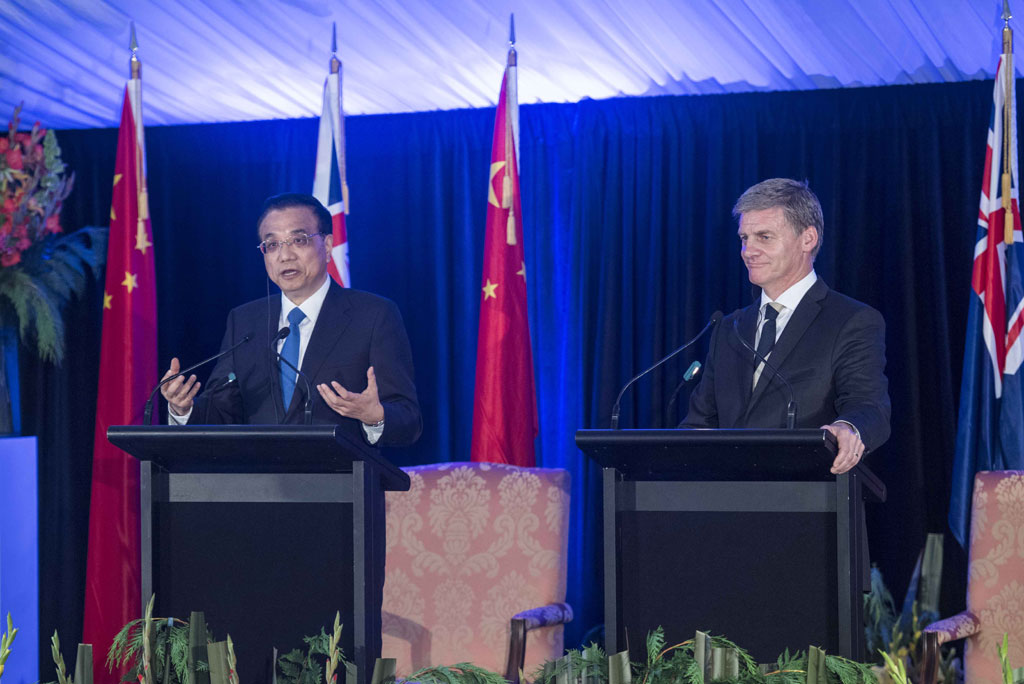Li's visit, a golden opportunity for Australia and New Zealand

By George N. Tzogopoulos
The strengthening of China's position in the Pacific is a critical parameter of its foreign policy. In that regard, Prime Minister Li Keqiang is making official visits to Australia and New Zealand in his attempt to further boost bilateral ties. Both Australia and New Zealand are significant at the political and economic level for Beijing's calculations. And the implementation of "Belt and Road" initiative further outlines aspects of a "win-win" collaboration.
Starting with Australia, bilateral relations are characterized by strong trade bonds. Li's recent visit is not an isolated event but shows continuity in the evolution of the bilateral partnership. It followed the visit by his Australian counterpart Malcolm Turnbull in China in April 2016. At that time, Turnbull had led a delegation of approximately one thousand business leaders. Perspectives for the future are even brighter on the grounds of bilateral deals sealed a few days ago in Canberra. The signing of a memorandum of understanding between China State Construction Engineering Corporation and Sydney-based BBI Group to build and develop a $6 billion iron ore mine in Australia is an example.
China is Australia's largest trading partner while Australia is a leading source of resources for China. The bilateral trade volume between China and Australia reached $107,8 billion in 2016 according to statistics of the Chinese government. China emphasizes that Australia constitutes an important economic partner and promises more trade and investments. This is what Li said on the occasion of the first visit of a Chinese premier to Australia. 2017 also marks the 45th anniversary of the establishment of Sino-Australian diplomatic giving an additional symbolical dimension to the visit.
For its part, Australia has seen the second highest volume of Chinese direct investment over the past 10 years. Also, as China is implementing the so-called 'New Normal' and its economy focusing more services and consumption than on exports, Australia sees rising opportunities for its export industry. The Australian wine industry constitutes a remarkable example of a sector which can benefit. As ABC has reported, approximately $520 million worth of wine was exported from Australia to China in 2016, up from $370 million in 2015.
The China-Australia Free Trade Agreement (ChAFTA), which came into force 2015, has already started to yield results. China is boosting its opening strategy and its companies enjoy more opportunities to do business in Australia. Moreover, more than 86% of Australian goods exports to China now enter duty free. As an analysis of the Australian Ministry for Trade, Tourism and Investment suggests, this should rise to 94% by 2019 and 96% by 2029. It is not a coincidence that the two sides agreed to begin negotiations to further expand the ChAFTA to other fields, especially services and investment. The good bilateral climate was outlined by the decision of both prime ministers to attend an Australian Football (AFL) match. Some international media spoke about 'football diplomacy'.
As far as New Zealand is concerned, although numbers are smaller in comparison to Australia, its importance is high. Its free trade agreement with China came into force nine years ago. Bilateral trade significantly increased subsequently. According to official New Zealand statistics, it was nearly tripled over the past decade, with bilateral trade rising from $8.2 billion in the year ended June 2007 to $23 billion in the June 2016. As it is the case with Australia, China is interested in upgrading the bilateral free trade agreement during a year which also marks the 45th anniversary of the establishment of diplomatic relations. E-commerce is a sector where talks will concentrate.
The editorial of The New Zealand Herald sees Li's visit as 'a golden opportunity'. Since 2014 the two countries have elevated their relationship to a comprehensive strategic partnership and are currently looking at new collaboration patterns of mutual benefit. Accordingly, Ambassador of New Zealand to China, John McKinnon, describes the relationship between the two countries as being based on genuine friendship and expects it to further expand. It should not be forgotten that Wellington has acknowledged Beijing's Market Economy Status (MES) and has joined Asian Investment and Infrastructure Bank (AIIB).
Although Li's visit in both Australia and New Zealand will play a constructive role for the future shaping of China's relations with these countries, some problems should not be overlooked. Both Australia and New Zealand belong to the Western spectrum and sometimes show some reluctance in endorsing China's plans. They also support Washington's position on important political affairs such as the Air Defense Identification Zone. Obviously, the US sees the steady evolution of 'Belt and Road' initiative in the Pacific suspiciously and endeavors to prevent synergies as well as joint projects. Under these circumstances, for instance, Australia blocked Ausgrid energy grid sale to Chinese companies last August. But Turnbull was diplomatic a few days ago clarifying that his country 'does not have to choose between the US and China'.
Last but not least, China is currently approaching Australia and New Zealand counting on a significant advantage which would have been inconceivable a few years ago. This is its straightforward support for globalization and free trade as opposed to the US current obscure stance under Donald Trump. Naturally, Beijing is gradually acquiring a leading role which cannot be ignored by its partners, now Canberra and Wellington.
Dr George N. Tzogopoulos is a lecturer at the European University in Nice, France and the Democritus University in Thrace, Greece. He is also a research fellow at the Centre International de Formation Européenne (CIFE), the Hellenic Foundation for European and Foreign Policy (ELIAMEP) where he coordinates its Asian Studies Programme and a research associate at the European Council of Foreign Relations (ECFR). George is also the founder of chinaandgreece.com an institutional partner of CRI Greek.






